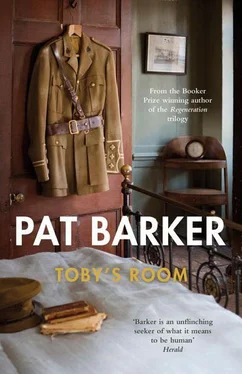Only it never was, quite. That smell broke the last numbness of shock. The following day Elinor’s mother left for Rachel’s house; Elinor was left alone, and glad to be alone. The parcel containing Toby’s clothes remained in her mind, but separated from her waking consciousness, like a nightmare whose every detail is forgotten, though the fear survives, poisoning the day.
Now that she could work at home, there was no need to go back to London. She spent all the hours of daylight painting in the barn across the yard, creeping back into the house at dusk, often forgetting to eat at all. At night, she slept in Toby’s room.
Painting numbed the pain; nothing else did. In the evenings, when she was too exhausted to work, she sat in front of the fire, trying to read. Usually, she had to abandon the attempt because nothing stayed in her head. She could read the same paragraph half a dozen times and still not be able to remember what it said. Above her head the floorboards creaked as if somebody were pacing up and down in the corridor outside his room. She paid no attention to this. It was a trivial manifestation of her state of mind; no more.
For long stretches of time he might not have died at all. He wasn’t present, but then he hadn’t been present for most of the past two years. There was no body. No grave. No ceremony. Only his spare clothes, the stuff he’d left behind when he went into the line for the last time, and they’d been pushed out of sight.
At first, this limbo state didn’t bother her, but then, as the days and weeks went by, not knowing how he’d died became a torment. She had to make his death real; otherwise this half-life could go on for ever. She knew there were people who cherished the malignant hope that their sons or husbands were still alive, prisoners of war perhaps, or mad, wandering the French countryside with no memory of who they were, or lying in a hospital bed too badly wounded to communicate at all. These were hardly consoling thoughts, and yet people clung to them. Anything, rather than face up to the finality of death. But it was finality that she’d begun to crave.
She knew so little. What did ‘Missing, Believed Killed’ actually mean? What degree of certainty did it imply? Apart from the telegram and the official letter that followed, there were only two brief notes, one from Toby’s CO, another from the Chaplain. She read them again and again. How short they were, how grudging. She’d been puzzled by that at the time, though nobody else seemed to notice anything amiss. And there was another thing: Kit Neville, who was in the Royal Army Medical Corps and had served with Toby, hadn’t written.
The more she thought about that, the more extraordinary it seemed. She wrote to him, asking if he knew anything about Toby’s death. No reply. Thinking he might not have got the letter, she wrote again. Still no reply. She bought The Times and searched the columns of wounded and dead for Kit’s name, convinced that something dreadful must have happened to him — nothing short of serious injury or death could excuse his silence — but his name wasn’t in the lists. Of course it might have been in previous issues, but no, if he were back in London she’d have heard.
She was left with nothing to fill the gap but her own imagination, and even imagination needs some facts to work on. Now, when it was too late, she’d have liked to know the details of Toby’s life out there, but her long insistence on ignoring the war worked against her. When she tried to picture his final hours, her mind was blank.
One morning she began to paint Toby’s portrait, wondering why it had taken her so long to think of doing it. As she worked, she kept stepping back from the easel and closing her eyes. She could see him more clearly like this: the shape of his head, the way his hair sprang from his temples, the blue eyes so like her own, but with a fleck of brown near the right pupil, his ears, the lobes extravagantly long and full; and then down across his body: the wart an inch away from his left nipple, the appendicitis scar …
It was about this time she became aware that the smell of his clothes had begun to invade the lower rooms.
At first she thought she must be imagining it. She was reminded of how the smell of the cadaver had pursued her even when she was miles away from the Dissecting Room. How strange: she hadn’t thought about that for years. But now, she remembered lying in bed at night, sniffing her fingers, always catching the whiff of formaldehyde though it couldn’t possibly have been there. Warily, she lifted her fingers to her nose, relieved to find only the familiar smells of oil and turps. No, the smell was just her imagination running away with her. She had to get a grip, stop thinking about the uniform, thrust it away again out of sight. And for a time she succeeded: the smell did seem to go away, only to return, a few days later, even more pungent than before.
She couldn’t finish the portrait, or rather she couldn’t trust herself to recognize the moment when it was finished. Her judgement had deserted her. A morning came when she hardly managed to work at all. Toby’s features eluded her; his face seemed to be sliding in and out of focus. She took a short break and tried again, but it was no use. Tiredness; she’d been working too hard. This time, she gave herself several days off, only to find, when she returned to the studio, that she couldn’t paint at all.
The clothes in the attic drew her to them. For days the smell had been particularly strong, especially in the corridor outside his room. At last, early one morning when it was no more than half light, she steeled herself to go upstairs to the attic. Madly, she managed to convince herself there would be nothing there. Rats and mice would have eaten them. So it was a shock to grope behind the old rug and the blankets she’d piled in front of them and find them still there, instantly recognizable to her probing fingertips by the cardboard stiffness of the cloth. She pulled the tunic clear of the wrapping and shook it, producing such a cloud of dust she started to cough. Then she wrapped the paper round the clothes again and carried them down the narrow stairs, clinging on to the banisters with an old woman’s fear of falling. If she fell now she could lie here for days.
At the foot of the stairs she hesitated, cradling the lifeless bundle in her arms, wondering where to take it, but these were his things: they belonged in his room.
She dropped the parcel on the floor beside the bed, and knelt down to look at the clothes. The smell was still there, but fainter now. This was hardly reassuring, since it meant she must have been imagining it, in part at least. On a sudden impulse, she began laying out the garments on the bed: the peaked cap, the tunic, the Sam Browne belt and revolver case, breeches, putties, boots … And there he was, his body shaped by the clothes he’d worn in life.
The smell was getting stronger again. Nothing else, nothing, could have made her want to imagine how he’d died. No words, no photographs, would have been powerful enough to break the taboo she’d imposed on herself: that the war was not to be acknowledged. But now smell, the most primitive of the senses, the one most closely linked to memory and desire, had swept all that away.
Bullet wound, bayonet wound, shrapnel? She saw him staggering on a few paces before collapsing, lying under the patient stars, alone. Only that was nonsense, of course; if he’d died like that there’d have been a body. A grave. Even the cadaver she’d worked on all those years ago had been buried in the end. What she couldn’t grasp was the idea of a human being disintegrating; nothing left, not even a pile of greasy bones. And in only a second. Painless, everybody said. Yes, but also inhuman. Outside the natural order of things.
Читать дальше












